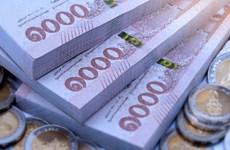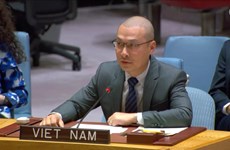APEC leaders vow to maintain stimulus policies
Leaders of the 21-member Asia- Pacific
Economic Cooperation (APEC) forum on Nov. 15 pledged to maintain
economic stimulus policies until a durable economic recovery has
clearly taken hold.
Leaders of the 21-member Asia- Pacific
Economic Cooperation (APEC) forum on Nov. 15 pledged to maintain
economic stimulus policies until a durable economic recovery has
clearly taken hold.
“ We will work together to strengthen the momentum towards strong, sustainable and balanced global economic growth, as set out at the recent G-20 Summit in Pittsburgh,” the APEC leaders said in a joint declaration named “Sustaining growth, Connecting the region” issued before the group's two-day summit ended.
The leaders recognised the necessity to develop a new growth paradigm for the changed post-crisis landscape, and an expanded trade and investment agenda that will strengthen regional economic integration in the Asia-Pacific region.
They were unanimous that APEC cannot go back to “growth as usual”, but will put in place a comprehensive long-term growth strategy that supports more balanced growth within and across economies, achieves greater inclusiveness in societies and sustains the environment.
While voicing support for the goals of the G-20 Framework for Strong, Sustainable and Balanced Growth, the APEC leaders affirmed the resolve to ensure that future economic growth is more inclusive, to broaden access to opportunities created by growth and to spread the benefits of growth more widely.
They agreed that APEC’s inclusive growth agenda will be driven by two key thrusts. First, APEC will undertake structural adjustments that will enhance opportunities for all segments of society to benefit from growth.
Second, APEC will strengthen social resilience to help individuals overcome short-term difficulties while providing the incentive for long-term effort, with a focus on the most vulnerable in their economies.
On promoting sustainable growth, the APEC leaders promised to ensure that economic growth in the region is consistent with sustainable development. In noting that anthropogenic climate change is one of the biggest global challenges, the APEC leaders reaffirmed their commitment to tackle the threat of climate change and work towards an ambitious outcome in Copenhagen , within the objective, provisions and principles of the United Nations Framework Convention on Climate Change (UNFCCC).
In regard to resisting protectionism, the APEC leaders rejected all forms of protectionism and reaffirmed their commitment to keep markets open and refrain from raising new barriers to investment or to trade in goods and services.
The joint declaration also emphasised the APEC leaders’ support for the multilateral trading system, accelerating regional economic integration, strengthening economic and technical cooperation, enhancing human security, fighting corruption, and improving governance and transparency.
The APEC leaders also issued a separate statement on “ A new growth paradigm for a connected Asia-Pacific in the 21st century,” endorsing the goals of the G-20 Framework for Strong, Sustainable and Balanced Growth.
Representing the economically most dynamic region in the world and accounting for half of global trade and output, APEC is well placed to provide the momentum necessary to achieve these goals, the statement said.
“Strong and sustained economic growth will require structural reforms to gradually unwind global imbalances and raise the potential output of our economies. To achieve inclusive growth, APEC must broaden access to economic opportunities and build the resilience of the most vulnerable against economic shocks,” it said.
According to the statement, future growth must be compatible with global efforts to protect the environment and mitigate climate change. At the same time, efforts to address climate change must be consistent with international trade obligations.
For the goal of a connected Asia-Pacific in the 21st century, the leaders said APEC will take a comprehensive approach to build a 21st century model of economic integration that will combine trade liberalisation “at the border”, improve the business environment “behind the border”, and enhance supply chain connectivity “across the border”.
They asserted that APEC will launch a pathfinder initiative led by Australia , Canada , Japan , the Republic of Korea , New Zealand , Singapore , and the United States to practise self-certification of origin so that businesses can better take advantage of free trade agreements in the region.
The region will also take forward the APEC Services Initiative having agreed to an action plan as well as principles to promote cross-border trade in services.
For “behind the border” structural reforms, the APEC leaders stressed that a key component of their structural reform efforts to reduce regulatory impediments is the Ease of Doing Business Action Plan.
Accordingly, APEC will strive to achieve by 2015 a collective 25 percent reduction in the cost, time, and number of procedures and a 5 percent reduction in business transaction costs by 2010.
To enhance APEC’s supply chain connectivity, the leaders agreed to explore how to enhance multi-modal connectivity by air, sea, and land, to facilitate a more seamless flow of goods and services, and business travellers throughout the Asia -Pacific./.
“ We will work together to strengthen the momentum towards strong, sustainable and balanced global economic growth, as set out at the recent G-20 Summit in Pittsburgh,” the APEC leaders said in a joint declaration named “Sustaining growth, Connecting the region” issued before the group's two-day summit ended.
The leaders recognised the necessity to develop a new growth paradigm for the changed post-crisis landscape, and an expanded trade and investment agenda that will strengthen regional economic integration in the Asia-Pacific region.
They were unanimous that APEC cannot go back to “growth as usual”, but will put in place a comprehensive long-term growth strategy that supports more balanced growth within and across economies, achieves greater inclusiveness in societies and sustains the environment.
While voicing support for the goals of the G-20 Framework for Strong, Sustainable and Balanced Growth, the APEC leaders affirmed the resolve to ensure that future economic growth is more inclusive, to broaden access to opportunities created by growth and to spread the benefits of growth more widely.
They agreed that APEC’s inclusive growth agenda will be driven by two key thrusts. First, APEC will undertake structural adjustments that will enhance opportunities for all segments of society to benefit from growth.
Second, APEC will strengthen social resilience to help individuals overcome short-term difficulties while providing the incentive for long-term effort, with a focus on the most vulnerable in their economies.
On promoting sustainable growth, the APEC leaders promised to ensure that economic growth in the region is consistent with sustainable development. In noting that anthropogenic climate change is one of the biggest global challenges, the APEC leaders reaffirmed their commitment to tackle the threat of climate change and work towards an ambitious outcome in Copenhagen , within the objective, provisions and principles of the United Nations Framework Convention on Climate Change (UNFCCC).
In regard to resisting protectionism, the APEC leaders rejected all forms of protectionism and reaffirmed their commitment to keep markets open and refrain from raising new barriers to investment or to trade in goods and services.
The joint declaration also emphasised the APEC leaders’ support for the multilateral trading system, accelerating regional economic integration, strengthening economic and technical cooperation, enhancing human security, fighting corruption, and improving governance and transparency.
The APEC leaders also issued a separate statement on “ A new growth paradigm for a connected Asia-Pacific in the 21st century,” endorsing the goals of the G-20 Framework for Strong, Sustainable and Balanced Growth.
Representing the economically most dynamic region in the world and accounting for half of global trade and output, APEC is well placed to provide the momentum necessary to achieve these goals, the statement said.
“Strong and sustained economic growth will require structural reforms to gradually unwind global imbalances and raise the potential output of our economies. To achieve inclusive growth, APEC must broaden access to economic opportunities and build the resilience of the most vulnerable against economic shocks,” it said.
According to the statement, future growth must be compatible with global efforts to protect the environment and mitigate climate change. At the same time, efforts to address climate change must be consistent with international trade obligations.
For the goal of a connected Asia-Pacific in the 21st century, the leaders said APEC will take a comprehensive approach to build a 21st century model of economic integration that will combine trade liberalisation “at the border”, improve the business environment “behind the border”, and enhance supply chain connectivity “across the border”.
They asserted that APEC will launch a pathfinder initiative led by Australia , Canada , Japan , the Republic of Korea , New Zealand , Singapore , and the United States to practise self-certification of origin so that businesses can better take advantage of free trade agreements in the region.
The region will also take forward the APEC Services Initiative having agreed to an action plan as well as principles to promote cross-border trade in services.
For “behind the border” structural reforms, the APEC leaders stressed that a key component of their structural reform efforts to reduce regulatory impediments is the Ease of Doing Business Action Plan.
Accordingly, APEC will strive to achieve by 2015 a collective 25 percent reduction in the cost, time, and number of procedures and a 5 percent reduction in business transaction costs by 2010.
To enhance APEC’s supply chain connectivity, the leaders agreed to explore how to enhance multi-modal connectivity by air, sea, and land, to facilitate a more seamless flow of goods and services, and business travellers throughout the Asia -Pacific./.












